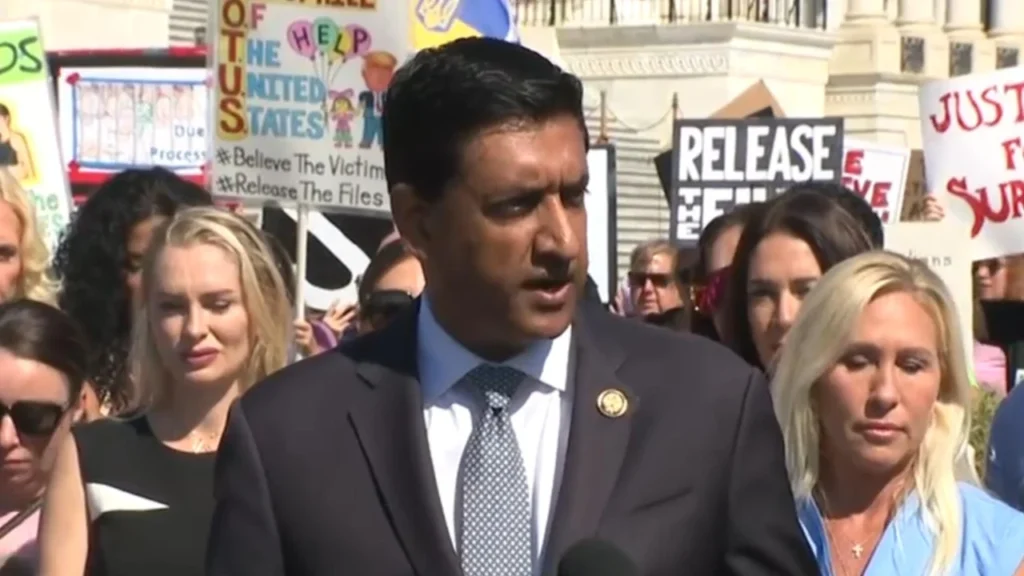Chauntae Davies, who says she survived abuse by Jeffrey Epstein, told reporters this week. She said Epstein kept an 8 by 10 framed photo of Donald Trump.
Davies said Epstein spoke often about his powerful friendships and prized them. She called one connection his biggest brag, and said he showed it to guests.
Survivors gathered on Capitol Hill to press lawmakers for more files. Republican Thomas Massie and Democrat Ro Khanna helped organize the event.

Rep. Ro Khanna (D-CA) stands alongside Epstein survivors on Capitol Hill, advocating for the release of all related investigative files. (Source: ABC News)
The House released about thirty three thousand pages of Justice Department records this week. Survivors and some lawmakers said much of that material mirrored what was already public.
Rep Robert Garcia criticized the release, saying it added little new information. He urged searches at the CIA and FBI for files still marked classified.
Davies described trips she said she took with Epstein, including to his private island. She alleged abuse there, and said photos from those trips give reporters and investigators leads.
Other survivors shared similar demands for full transparency at the Capitol event. They said only complete records will show who enabled Epstein’s conduct and why.
Jack O’Donnell, a former Atlantic City casino executive, has told interviews about Epstein’s ties. He recalled an incident he said showed close access to influential men in the 1980s.
The White House strongly rejected O’Donnell’s account and questioned his credibility. Communications director Steven Cheung called the story false and attacked O’Donnell in a statement.
Lawmakers said they hope new searches will find names and contacts in classified files. Advocates argued those records could clarify how Epstein used his networks to recruit and move women.
Legal analysts warned that sifting tens of thousands of pages can hide key links inside large files. They urged targeted searches of intelligence holdings and agency archives to find those references.
Some House members backed a discharge petition to force a vote to unseal more material. That plan needs broad support and faces resistance from party leaders who worry about fallout.
Survivors said they wanted truth, not politics, as they called for full files to be released. They asked agencies to explain what they hold and why some documents remain classified.
Media reports noted that the news conference brought several victims forward for the first time in public. Those accounts said the survivors’ testimonies added urgency to lawmakers’ calls for more transparency.
Advocacy groups pressed Congress for a complete search of agency records tied to Epstein and his associates. They urged officials to release any names and contact lists found in classified files.
Legal experts said new disclosures could reopen debates over past investigative choices. Questions remain about whether investigators treated some witnesses or leads differently because of influence.
Some Republicans have joined Democrats in urging more openness, showing growing bipartisan pressure. That mix of support may change the odds for a successful unsealing push in the House.

Epstein survivors testify on Capitol Hill demanding full transparency of government files. (Source: ABC News)
Survivors said they will keep pushing until agencies release any withheld records that matter. They described the effort as part of a long fight for accountability and prevention of future harm.
Advocates expect more hearings, subpoenas, and court fights as lawmakers hunt for missing material. Public interest remains high, as survivors and activists keep the issue in the news cycle.
The White House said it has provided documents and denied holding a secret client list. Officials framed criticism as political, while survivors said that answer is not enough.
Legal teams for victims said they hope new records will help in ongoing civil cases. Court filings and witness statements might appear inside newly released agency material, they said.
For survivors, the aim is clear: end secrecy and make systems safer for future victims. They asked lawmakers to use every tool available to find and publish withheld documents.
Legal teams and advocates said they will file motions and suits if agencies refuse to cooperate promptly. More subpoenas and court fights are likely as lawmakers and lawyers press for access to records.
Lawmakers said they will continue pursuing documents until the public record is complete soon.

